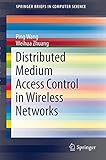Distributed Medium Access Control in Wireless Networks [electronic resource] / by Ping Wang, Weihua Zhuang.
By: Wang, Ping [author.].
Contributor(s): Zhuang, Weihua [author.] | SpringerLink (Online service).
Material type: BookSeries: SpringerBriefs in Computer Science: Publisher: New York, NY : Springer New York : Imprint: Springer, 2013Description: XII, 109 p. 42 illus. online resource.Content type: text Media type: computer Carrier type: online resourceISBN: 9781461466024.Subject(s): Computer science | Computer communication systems | Electrical engineering | Computer Science | Computer Communication Networks | Communications Engineering, NetworksAdditional physical formats: Printed edition:: No titleDDC classification: 004.6 Online resources: Click here to access online
BookSeries: SpringerBriefs in Computer Science: Publisher: New York, NY : Springer New York : Imprint: Springer, 2013Description: XII, 109 p. 42 illus. online resource.Content type: text Media type: computer Carrier type: online resourceISBN: 9781461466024.Subject(s): Computer science | Computer communication systems | Electrical engineering | Computer Science | Computer Communication Networks | Communications Engineering, NetworksAdditional physical formats: Printed edition:: No titleDDC classification: 004.6 Online resources: Click here to access online Introduction -- Literature Review and Background -- Voice Capacity Improvement over Infrastructure WLANs -- Service Differentiation over Ad Hoc WLANs -- Dual Busy-tone MAC for Wireless Ad Hoc Networks -- Collision-free MAC forWireless Mesh Backbones -- Conclusions.
This brief investigates distributed medium access control (MAC) with QoS provisioning for both single- and multi-hop wireless networks including wireless local area networks (WLANs), wireless ad hoc networks, and wireless mesh networks. For WLANs, an efficient MAC scheme and a call admission control algorithm are presented to provide guaranteed QoS for voice traffic and, at the same time, increase the voice capacity significantly compared with the current WLAN standard. In addition, a novel token-based scheduling scheme is proposed to provide great flexibility and facility to the network service provider for service class management. Also proposed is a novel busy-tone based distributed MAC scheme for wireless ad hoc networks and a collision-free MAC scheme for wireless mesh networks, respectively, taking the different network characteristics into consideration. The proposed schemes enhance the QoS provisioning capability to real-time traffic and, at the same time, significantly improve the system throughput and fairness performance for data traffic, as compared with the most popular IEEE 802.11 MAC scheme.


There are no comments for this item.